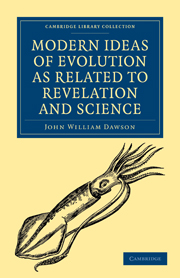Book contents
- Frontmatter
- PREFACE
- Contents
- CHAPTER I PRESENT ASPECTS OF THE QUESTION
- CHAPTER II WHAT IS EVOLUTION?
- CHAPTER III THE ORIGIN OF LIFE
- CHAPTER IV THE APPARITION OF SPECIES IN GEOLOGICAL TIME
- CHAPTER V MONISTIC EVOLUTION
- CHAPTER VI AGNOSTIC EVOLUTION
- CHAPTER VII THEISTIC EVOLUTION
- CHAPTER VIII GOD IN NATURE
- CHAPTER IX MAN IN NATURE
- CHAPTER X GENERAL CONCLUSIONS
- APPENDIX I WEISMANN ON HEREDITY
- APPENDIX II DR. McCOSH ON EVOLUTION
CHAPTER VIII - GOD IN NATURE
Published online by Cambridge University Press: 29 August 2010
- Frontmatter
- PREFACE
- Contents
- CHAPTER I PRESENT ASPECTS OF THE QUESTION
- CHAPTER II WHAT IS EVOLUTION?
- CHAPTER III THE ORIGIN OF LIFE
- CHAPTER IV THE APPARITION OF SPECIES IN GEOLOGICAL TIME
- CHAPTER V MONISTIC EVOLUTION
- CHAPTER VI AGNOSTIC EVOLUTION
- CHAPTER VII THEISTIC EVOLUTION
- CHAPTER VIII GOD IN NATURE
- CHAPTER IX MAN IN NATURE
- CHAPTER X GENERAL CONCLUSIONS
- APPENDIX I WEISMANN ON HEREDITY
- APPENDIX II DR. McCOSH ON EVOLUTION
Summary
In discussing the attitude of agnostic evolution, we have seen that its position is rendered untenable by the fact that it has no better evidence of matter and energy in which it believes than of God in whom it declines to believe. Spencer admits that our conception of matter is ‘built up or extracted from our experiences of force,’ and that it is only by energy that matter ‘demonstrates itself as existing.’ This second-hand demonstration is, however, perfectly satisfactory to all men, and they never, when of sound mind, refuse to act on their belief. But science must, in considering well its own principles, go much farther than this general creed as to matter. It must believe in different kinds of matter, atoms of different weights, an all-pervading ether, and multitudes of other entities of which it has no better evidence than their observed effects. Science therefore may apply the same reasoning to the human will, to the unseen spiritual world, and to God Himself, if only it can discover effects resulting from their action. It may be profitable to consider here this positive evidence in some of its departments.
The agnostic may say that he is content to regard all nature as a product of law, and that this, being inexorable and unchangeable, excludes the idea of a personal will. A little reflection will show that this position is altogether untenable. The laws of nature are in reality not powers or forces at all, but merely the ways in which energy has been found to act.
- Type
- Chapter
- Information
- Modern Ideas of Evolution as Related to Revelation and Science , pp. 171 - 201Publisher: Cambridge University PressPrint publication year: 2009First published in: 1890

